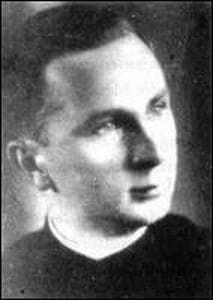
Blessed Gerhard Hirschfelder
Blessed
Feast Day: August 1
Birth: February 17, 1907
Death: August 1, 1942
Biography
Blessed Gerhard Hirschfelder, also known as Gerhard Hirschfelder of Klodzko, was a Catholic priest in the archdiocese of Münster, Germany. He was born on 17 February 1907 in Klodzko, Dolnoslaskie, Germany, which is now part of modern Poland. Hirschfelder was ordained as a priest in 1932 and became a member of the Schoenstatt Movement, a Marian apostolic movement within the Catholic Church.
A courageous and outspoken opponent of Nazism, Hirschfelder fearlessly preached against the atrocities committed by the Nazis. His sermons and public denunciations of the regime's ideology brought him under the scrutiny of the Gestapo, the secret state police of Nazi Germany. As a result, on 15 December 1941, he was arrested by the Gestapo.
Subsequently, Hirschfelder was imprisoned in the Dachau concentration camp, located in Oberbayern, Bavaria, Germany. Dachau was among the first Nazi concentration camps and served as a model for the subsequent network of camps established during World War II. Despite the harsh conditions and constant persecution, Hirschfelder stayed true to his faith and continued to offer spiritual guidance and solace to his fellow prisoners.
Sadly, Blessed Gerhard Hirschfelder's time in Dachau was cut short due to the inhumane treatment he endured. On 1 August 1942, at the age of 35, he succumbed to pneumonia and starvation, marking the end of his earthly pilgrimage. As a result of his martyrdom, his life and sacrifice were recognized by Pope Benedict XVI, who declared him venerable on 27 March 2010.
Further honoring his profound devotion and sacrifice, Gerhard Hirschfelder was beatified by Pope Benedict XVI on 19 September 2010. The recognition ceremony took place at the cathedral of Münster, Germany, with Cardinal Joaquim Meisner, the Archbishop of Cologne, presiding over the beatification celebration.
Blessed Gerhard Hirschfelder continues to be an inspiration for Catholics and beyond, serving as a reminder of the profound courage and unwavering faith displayed in the face of extreme adversity and persecution. His selfless dedication to preaching against Nazism and his ultimate sacrifice make him a symbol of hope and strength in the struggle against tyranny and oppression.